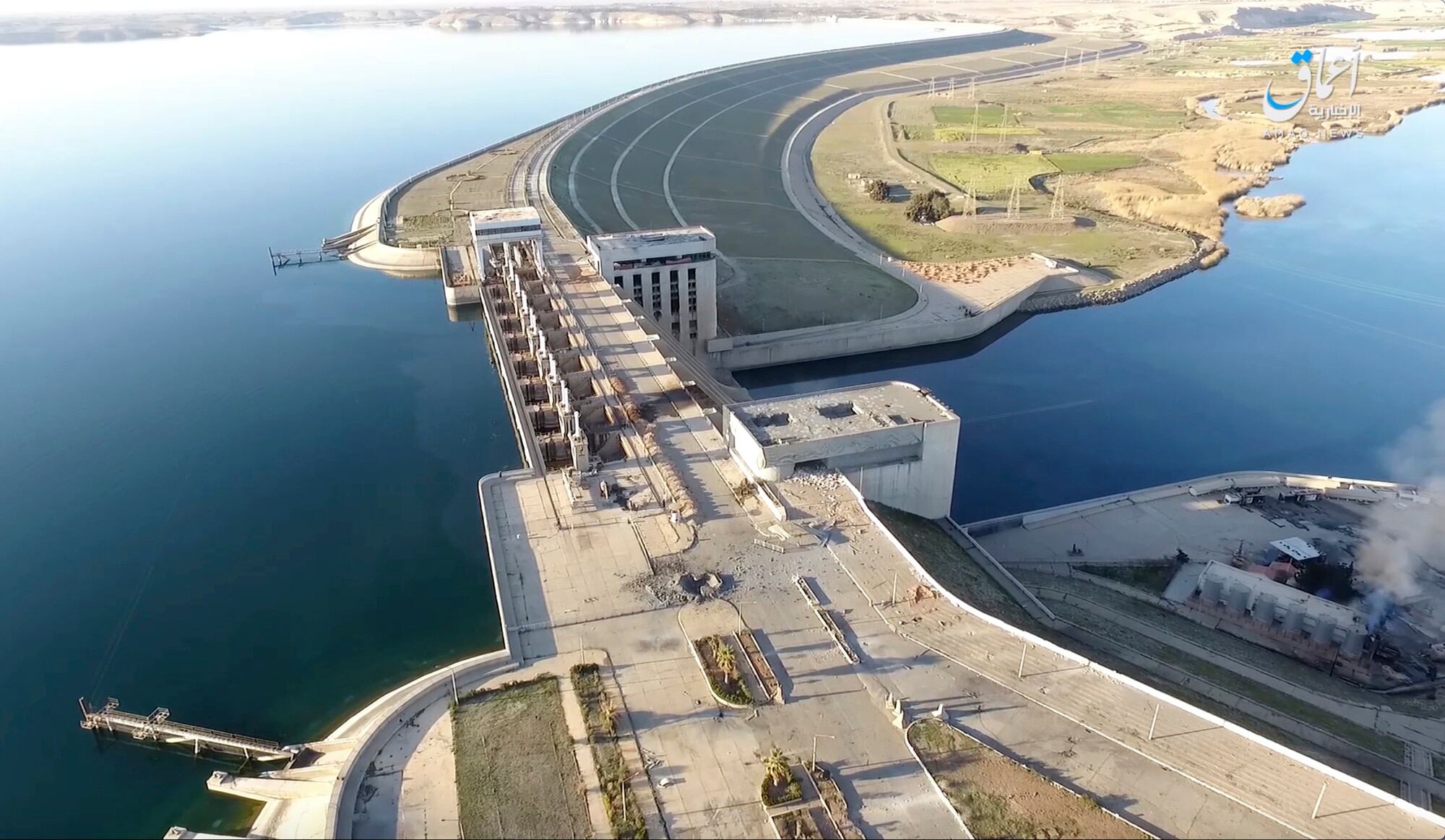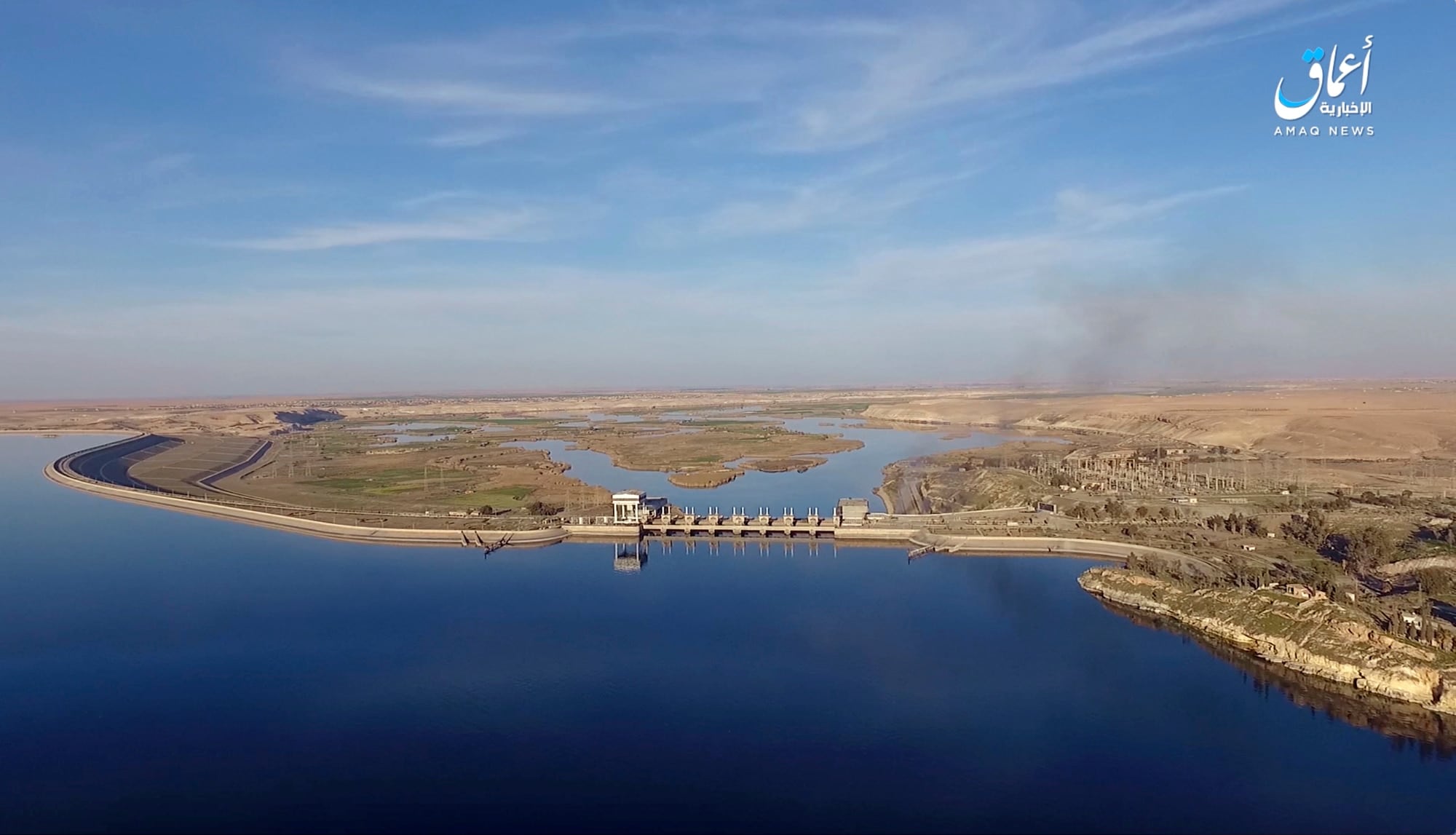BEIRUT — Syrian engineers and Red Crescent officials on Wednesday visited a spillway of a key dam west of the Islamic State group's stronghold of Raqqa, opening the gates and relieving pressure, according to the aid organization and Syrian Kurdish media.
The visit followed concerns that the Tabqa Dam is threatened, endangering the surrounding area that has become a battleground as U.S.-backed forces push toward Raqqa, the ISIS group's self-proclaimed capital. The main gates of the dam, further to the south from the spillway, are out of service.
The condition of the dam, Syria's largest and a strategic infrastructure still in the hands of ISIS, has been disputed after conflicting claims that it came under attack from the U.S.-led coalition, damaging the infrastructure, amid an unfolding offensive on the ISIS stronghold. The U.S.-led coalition denied targeting the dam, behind which lies Syria's largest water reservoir.
While ISIS still controls the main span of the dam and its gates, located about 40 kilometers (25 miles) upstream from the city of Raqqa, the U.S.-backed Kurdish-led forces control the spillway and canal, about 4 kilometers (2.5 miles) further to the north.
The Syrian Red Crescent spokeswoman, Mona Kurdy, said a team of its volunteers managed to reach the spillway on Wednesday in collaboration with the Syrian ministry of water resources. She said an earlier attempt to reach the site failed because of violence, and a volunteer was killed.
"We lost a volunteer as he tried to carry out his duties. ... There were strikes," she told The Associated Press. She didn't elaborate and wouldn't provide further details on the team's mission, citing security concerns.
Opposition activists and former dam engineers said the dam manager who appeared in an ISIS video about the dangers facing the dam, a technician, and a Red Crescent volunteer were killed late on Monday.
The engineers, who had previously worked in the dam issued a statement, saying the manager and the Red Crescent volunteer were killed as they attempted to reach the structure to deal with leakage in the main chambers. They didn't specify how they were killed.

This still image taken from drone footage posted online Monday, March. 27, 2017, by the Aamaq News Agency, a media arm of the Islamic State group, shows smoke rising near the Tabqa Dam, in Raqqa, Syria. U.S.-backed forces in northern Syria said Monday paused military operations near a major dam held by the Islamic State group in order to allow engineers to fix any problems after conflicting reports about its stability.
Photo Credit: Aamaq News Agency via AP
The activist Syrian Observatory for Human Rights said the manager was believed killed in a suspected coalition airstrike against a convoy after he left the dam in the middle of the night.
The coalition said in an email it was looking into the claim.
The fighting in this part of Syria is shaping up to be the next major battle against ISIS. Earlier this month, U.S. aircraft ferried hundreds of fighters from the Kurdish-led Syrian Democratic Forces, as well as American artillery and military advisers, behind ISIS lines. The U.S.-led forces seized control of the Tabqa airbase earlier this week. On Wednesday, fighting between the Syrian opposition forces and ISIS militants was reported on the dam itself.
Panic over rising water levels or the dam's malfunction has prevailed as the U.S.-backed forces advance on the ISIS stronghold. ISIS has warned that the dam's main gates are out of service, causing water levels to rise.
Former dam engineers said the opening of the spillway gates would relieve some pressure from the main gate but warned that the dam's main operations have been suspended, including local power generation.
Elsewhere in Syria, a bomb planted on a taxi van carrying university students in the central city of Homs killed at least five people and wounded four on Wednesday, the local police chief told state TV.
Maj. Gen. Khaled Hilal said the explosion went off in the 14-passenger van around midday in the city's al-Zahra district. Most residents of the neighborhood are Alawites, a minority sect that has traditionally formed the backbone of support for President Bashar Assad. The Syrian opposition is mainly drawn from the country's Sunni Muslim majority.
The attack came as Syrian rebels and their families were in the process of evacuating the last opposition-held neighborhood in the city under a surrender agreement with the government. The opposition has criticized the evacuation of the long-besieged al-Waer area, saying it amounts to the forced displacement of civilians, allegations the government denies.
Hilal said initial reports indicate a man placed a plastic bag under one of the van's seats and left the vehicle before the bomb went off. Footage aired on al-Ikhbariya state TV shows the skeleton of the van after the explosion, with the roof blown off and the back-side shattered. A pool of blood was visible near the wreckage.
Meanwhile, Russian officials in Geneva met with representatives of the Syrian opposition on the sidelines of talks mediated by the United Nations, part of efforts to find a political solution to the conflict.
Salim Muslet, a spokesman for the main Syrian opposition bloc gathered in Geneva, said discussions centered on cease-fire violations despite a truce brokered by Russia and Turkey.
He told reporters the participation of the Syrian opposition in the next round of Russia-sponsored talks in Astana, which Moscow has scheduled for early May, was contingent on progress on the ground.
Associated Press writers Dominique Soguel in Basel, Switzerland, and Albert Aji in Damascus, Syria, contributed to this report.





